Good Stationery as a Tool of Thought
One of the very odd things about human intelligence is that it can be greatly amplified through the use of simple tools.
Some examples that seem uninteresting because they are so trivial are actually quite important, as they show how weak an untrained un-augmented human mind is. A simple shopping list overcomes Miller’s observed short-term memory limit of “seven plus or minus two slots.” A couple of sheets of paper outperform any sort of “memory palace.” Writing down a thousand digits of Pi is a merely tedious task within the reach of anybody, not a feat of memorization requiring extensive practice. Multiplying two 5 digit numbers is tedious using pencil and paper, but considered an astounding feat of mental arithmetic.
It is amazing how powerful an augmented human mind is. We teach high school students to perform complicated calculus proofs and computations using only pencil and paper. Architecture and artistic composition are teachable pencil and paper skills. Only some sort of savant could try such things in their head.
In the other direction Socrates quotes Thamus in Plato’s dialogue “Phaedrus” implying that dependence on writing in fact weakens the mind:
Thamus replied: O most ingenious Theuth, the parent or inventor of an art is not always the best judge of the utility or inutility of his own inventions to the users of them. And in this instance, you who are the father of letters, from a paternal love of your own children have been led to attribute to them a quality which they cannot have; for this discovery of yours will create forgetfulness in the learners' souls, because they will not use their memories; they will trust to the external written characters and not remember of themselves. The specific which you have discovered is an aid not to memory, but to reminiscence, and you give your disciples not truth, but only the semblance of truth; they will be hearers of many things and will have learned nothing; they will appear to be omniscient and will generally know nothing; they will be tiresome company, having the show of wisdom without the reality.
-- Plato "Phaedrus" from Project Gutenberg.
However, I feel writing is a lever, not a crutch. I lean more towards Nina Zumel’s I Write, Therefore I Think.
The difference in ability with and without augmentation is so large you are forced to say either raw untrained un-augmented human intelligence is fairly low or augmented human intelligence is quite high. The difference is so large I don’t think it makes sense to say the two ability levels are comparable, one is not just an atrophied analogue of the other. You can train to be better without augmentation (and perhaps that is a good ability improving exercise), but you will always perform at an entirely different scale with augmentation.
So we have argued that scratch paper can augment human performance, but why should we consider that odd? Because it doesn’t work that way for any other intelligence we know. Humans perform significantly smarter with aids that are obviously intellectually inferior to the human: abacuses and notepads. It wouldn’t be a shock if humans performed significantly smarter using aids that are intellectually superior to them, as in that case it would be obvious the aid is doing the work and we wouldn’t have to ponder the synergy.
People have defined man as “the tool building animal.” We now know animals to some limited extent both create and use tools, but they don’t seem to be as weak as we are without them and gain so much from them. Computers, possibly another form of intelligence, are provably not improved by small augmentations. You add a 1GB thumb drive to your laptop (its equivalent to some scratch paper) and you get almost nothing in return. Any advantage (other than transferring information) the laptop could achieve from the thumb drive it can simulate faster in its own larger 8GB of ram or 0.5TB of disk storage. A laptop plus a thumb drive is pretty much just a laptop, not something more. If we consider organizations (universities, corporations, governments and so on) as organisms (a view I do not agree with) we can argue some increase in intelligence and institutional memory through record keeping and information technology. But, in my opinion, organizations don’t have significant emergent reasoning capabilities that aren’t really more properly attributed to their members.
Back to people, consider the following Steve Jobs quote:
I read a study that measured the efficiency of locomotion for various species on the planet. The condor used the least energy to move a kilometer. Humans came in with a rather unimpressive showing about a third of the way down the list....That didn't look so good, but then someone at Scientific American had the insight to test the efficiency of locomotion for a man on a bicycle and a man on a bicycle blew the condor away. That's what a computer is to me: the computer is the most remarkable tool that we've ever come up with. It's the equivalent of a bicycle for our minds.
-- Steve Jobs (transcription: treehugger.com from the documentary "Memory and Imagination").
And it is largely true: what a person can accomplish with a text editor, drawing packing, CAD package, symbolic algebra package or programming environment is astounding.
What I find strange about it is, the computers we are talking about are also vastly inferior to the human mind they are augmenting. A laptop computer certainly has a much higher “clock speed” than the human mind (computer cycles being in the 3 gigahertz range, synapses being in the 0.2 usec range, so a brain “clock cycle” is about 200,000 times slower than a laptop computer). But the brain has around 100 to 500 trillion synapses which are combinations of parallel storage and computation units.</a> So while a current laptop computer has capabilities (clock cycle and memory) in the tens of billions region the human brain has structures in the hundreds of trillions range, or about 10,000 times larger. Though by Moore’s law that is only about 32 years worth of hardware improvements apart!
One might argue some of the boost may be from software. A lot of human intelligence is distilled into software like CAD packages. I had heard the quote that over a person-millennia of time went into the creation of IBM’s AIX operating system. To me this is more of proof of how inefficient software is at capturing ideas. The person who told me this anecdote followed up that he felt this was a waste as given a person-millennia of effort to command he could re-invent most of modern civilization, not just yet another Unix derivative.
We have translated these philosophic ramblings into a system that has greatly improved our productivity. I have found that making it easier and more rewarding to work is much more effective than trying to develop “the discipline to work.” This is consistent with the theory that self control is a limited resource. This is also the flip size of Make it more effort to do the wrong thing: make it even more pleasant to start creative work.
I use computers, the internet and the Wikipedia extensively every day. But, they are distracting and I don’t like having them around at all times. This is why I that ubiquitous good stationery (not portable computers) is the tool I want. So a way to increase your degree of augmentation and typcial ability is: spend a ridiculous amount of effort to have around at all times notepads of varying sizes and capabilities. I have seen a big increase in productivity since saturating my environment with many notepads of different sizes. If you have a good notebook around you will find ways to use it. I always take the largest one that isn’t entirely silly to have around.
My day to day notebook is a soft 5 inch by 3.5 inch pocket notebook as shown below. I use a mechanical pencil when out and about (no breakage or sharpening) and take a small eraser (in this case an eraser shaped like Lego). This book is good for notes and ideas. Notice I cross them out when I have acted on them in some way (done the work, or given up on the idea). The goal of the daily notebook is to eventually throw it away (not save it). So all work needs to move out and I need to be able to know it has been moved.
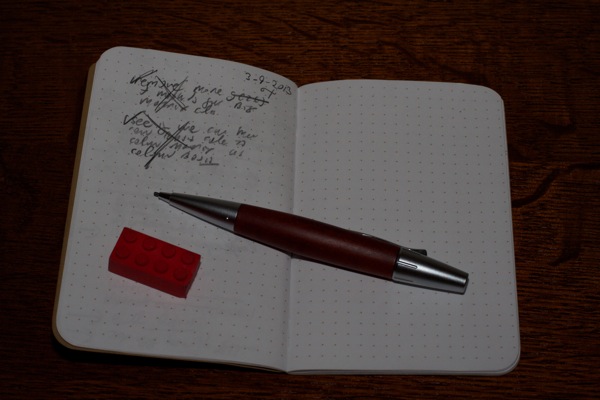
While I can always have this notebook on me it is too small for large calculations or drafts. For larger work I use a good composition book with a pencil, eraser and sharpener in a bandolier.
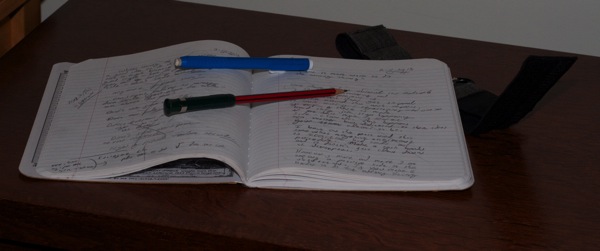
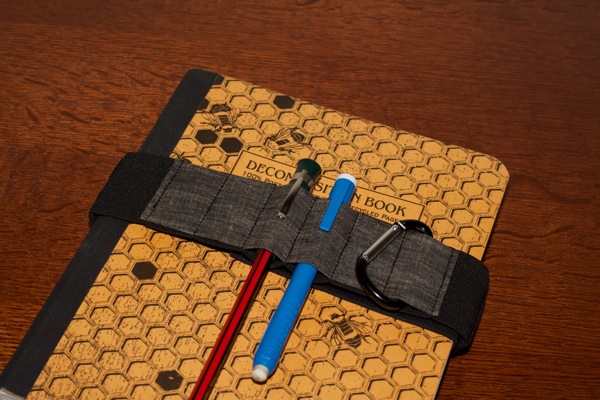
For longer projects I switch to a sketch book with a couple of thick and thin mechanical pencils plus drawing chalk. In additional to being able to work problems and take notes I can take drawing breaks which help restore the mind. The point is to exploit the prepare then relax concept expressed so well in Jacques Hadamard’s “The Psychology of Invention in the Mathematical Field.”
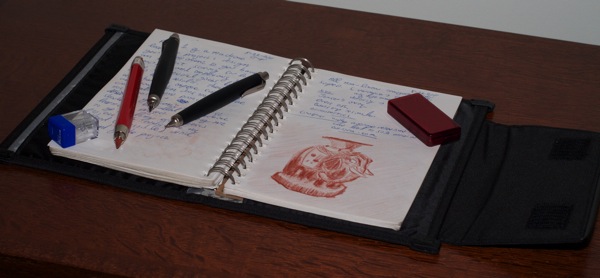
Below is the 14 inch by 17 newsprint pad on a Mabef desk easel that I keep in my work area. I use it for todo-lists, incidental notes and computation, much like you would use a traditional desk blotter. It is also incredibly useful for rubber duck debugging when alone, as I can take the Alvin clipboard down and write descriptions of what I am looking at (often enough to find problems or force ideas). In this photo I am working through one of the steps in the Win-Vector Linear Programming Library (which itself started as a single-line notepad entry asking what was the smallest linear algebra library that could efficiently support linear programing).
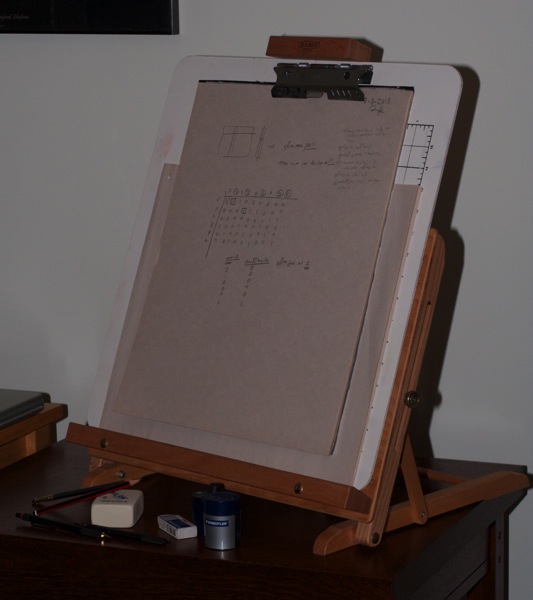
And I have the mini-notepad with pencil velcroed to it that I keep on my nightstand. I almost never write anything in it, but knowing it is there if I do want to remember something actually makes it easier to end the day (almost the opposite of an intrusion).
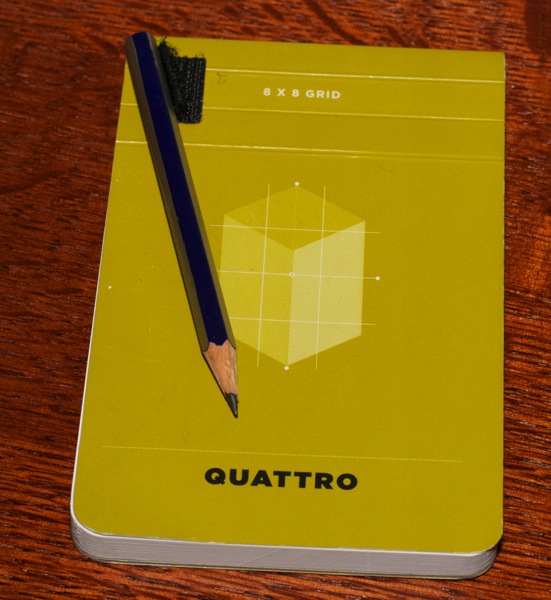
Good stationary is a cheap vice. A cheap pencil costs about a dime. A good pencil costs about thirty cents. A top grade drawing pencil (usually considered too good for writing) is only around $1.50. Just for fun I show below an eraser in the shape of Ramen I picked up for a few coins.
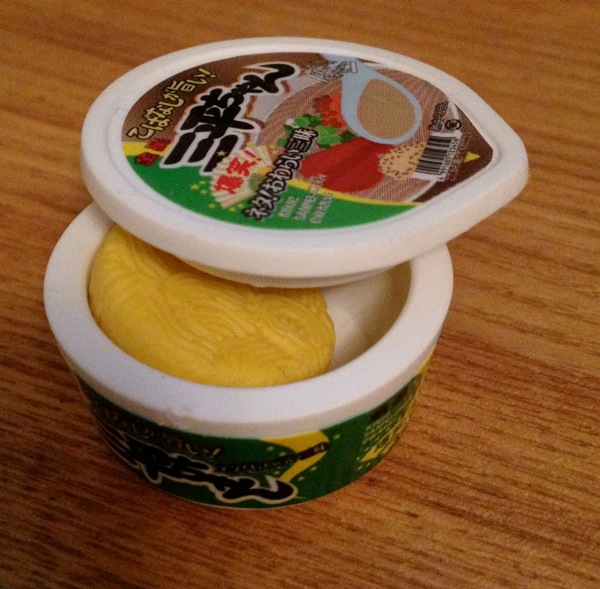
Increasing your use of tools without increasing your exposure to distractions is a great way to increase your abilities and get a lot more done. We are used to buying tools to decrease the pain of unpleasant tasks (for example: a good structured XML editor I recently purchased has paid for itself many times over, but I still hate working with XML). We need to get more used to buying tools that improve pleasant tasks and play to strengths. The mind also craves variety, so you want to “over buy” and get a set of pencils, pens and notepads you can rotate through to prevent acclimatization. Since stationery items are relatively cheap, they are good place to play the spendthrift.